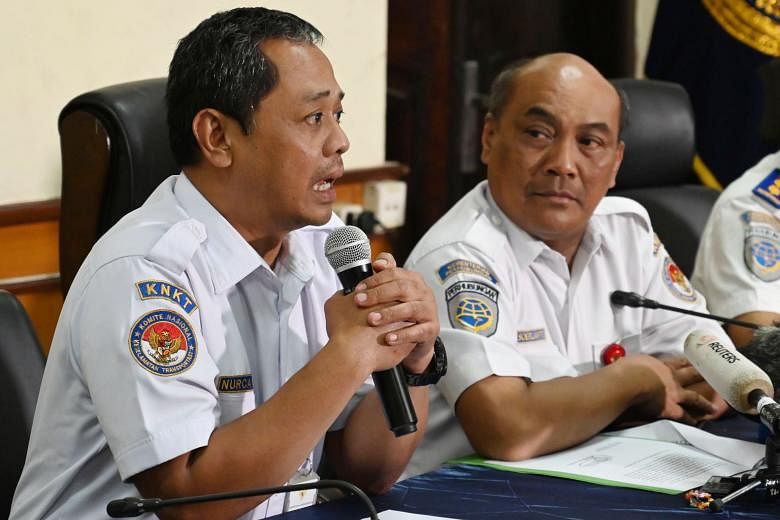JAKARTA • Indonesia's aviation safety regulator has interviewed an off-duty pilot who helped the crew of a Boeing 737 Max 8 disable a malfunctioning control system when their flight ran into trouble, just a day before the ill-fated aircraft crashed.
In a press briefing yesterday, National Transportation Safety Committee (NTSC) chairman Soerjanto Tjahjono said the regulator interviewed the pilot, but declined to name him or say what role he played in saving the flight.
Mr Soerjanto said the NTSC will not release details of the discussions until the investigation of Lion Air Flight 610, which crashed in October last year, is completed.
The possibility of a malfunction of the 737 Max's safety system - designed to keep planes from climbing too steeply and stalling - has come under the spotlight after the Lion Air flight and an Ethiopian Airlines flight crashed fewer than five months apart, killing 346 people in total.
The system had baffled pilots by pushing the Lion Air plane's nose downward dozens of times, exerting more and more force until they lost control.
The same measure had kicked in with alarms blaring shortly after take-off on the flight the evening before the October crash. The pilot riding in the jumpseat suggested the crew flip switches that cut power to the haywire system.
The presence of an extra pilot may help investigators determine how some pilots faced with the malfunction have been able to avert disaster, while others lost control of their planes and crashed.
Indonesian investigators yesterday also disclosed that the cockpit voice recorder from the crashed Lion Air jet showed pilots were searching for the right checklist in their handbooks and were experiencing airspeed and altitude issues.
Mr Nurcahyo Utomo, an investigator at the NTSC, said the recording showed there was "panic" in the cockpit in the last 20 seconds of the flight.
"At the end of the flight, it seemed the pilot felt he could no longer recover the flight; then the panic emerged," he said, but declined to reveal which pilot had panicked.
Investigators said they have 90 per cent of the data needed to release a final report on the October crash, which is expected to be released in August this year.
Mr Soerjanto said the NTSC has offered to cooperate with the Ethiopian authorities who are investigating the Ethiopian Airlines crash earlier this month.
The twin disasters, the latest occurring earlier this month, led to a global grounding of the 737 Max jetliner, with the United States notably behind the rest of the world.
BLOOMBERG, REUTERS

